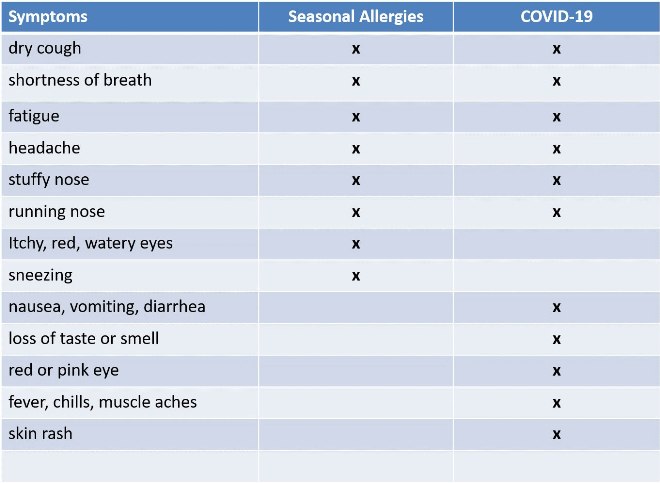
Photo Credit: by Mladen Borisov, Unsplash.com
As we move further into the spring months and allergy season, coincidentally, most parts of the world are swimming in the middle of the 3rd wave of COVID-19 pandemic and trying to stay afloat. Flowers are budding and the grass is regaining its green color. We should all be thankful that spring is here but along with the beautiful sceneries of spring comes seasonal allergies. It then becomes important to understand the peculiarities of COVID-19 and how its symptoms may overlap with those of seasonal allergies and how you may protect yourself.
What are the similarities in symptoms?
Seasonal allergies, also known as hay fever occurs as result of an immune response to allergens present in the air only in specific months of the year. COVID-19 is a respiratory illness caused by a novel coronavirus called SARS-CoV-2, but with symptoms that spread further beyond the respiratory tract. There are quite some similarities between the illnesses in terms of the signs and symptoms and so it may be hard to tell a difference when the symptoms appear. The only way to confirm if you have COVID or seasonal allergy is to get tested for COVID-19. Some of the signs and symptoms common to seasonal allergies and COVID-19 are: cough, sneezing, running nose, stuffy nose, fatigue and headache. Seasonal allergies can worsen an existing asthma condition and make it difficult to breathe. Similarly, shortness of breath is one of the common symptoms of COVID-19.
What are the major differences in symptoms?
Running or stuffy nose, itchy, red and watery eyes are more common with seasonal allergies than with COVID-19, although COVID-19 can also present with red/pink eye (conjunctivitis). Notably, the symptoms of seasonal allergies occur shortly after exposure to the allergens so the symptoms may show up after spending some time outside in the allergy season. Some people with COVID-19 may also experience diarrhea, loss of taste or smell, which are not usually applicable with seasonal allergies. Occasionally, decreased sense of smell may occur in seasonal allergies due to nasal congestion but not total loss of smell and or taste.
Basically, if you have tendency to have seasonal allergies based on previous years’ experiences or family history, then you need to watch closely your symptoms to ensure accurate diagnosis. If you develop symptoms of seasonal allergies, you may try to use an antihistamine such as Zytrec (Cetirizine). Zyrtec 5mg and 10mg are available over-the-counter. 20 mg strength requires a valid prescription in which case you need to consult with your doctor. If symptoms do not improve, then your symptoms may require further investigation.
Seasonal allergy is not contagious, that means if someone with allergy sneezes on you, you cannot become infected since it is not caused by an infection. However COVID-19 is contagious and as such can be spread from one person to another via mucosalivary droplets dispersed during coughing, sneezing or talking. Less commonly, transmission could also occur via touching of a contaminated surface and then touching of the face, nose, mouth or eyes. According to CDC, COVID-19 can sometimes be spread by airborne transmission, ie, through sharing the same air with an infected person, especially in an enclosed area with poor circulation.

Photo Credit: by Dr. Bolanle Aina, Seasonal allergies vs Covid-19 similarities and differences
How do I protect myself?
There are a number of vaccines approved to protect people against COVID-19. COVID-19 vaccine administration is recommended to protect people from getting sick or to prevent complications if they do get it. In order to avoid symptoms of seasonal allergies, the best approach is to avoid exposure to the allergens. It is important to identify your triggers/allergens and then avoid them as much as possible. Interestingly wearing masks can keep off the allergens while at the same time preventing the spread of COVID-19.
For more information about how to get vaccinated in Canada, the government of Canada has put together this resource page, where you can get information about COVID-19 vaccination campaigns in various provinces. For US residents, visit this CDC webpage to get more information on different COVID vaccines that are available, how to get a vaccine and what activities you can do after being fully vaccinated.
In conclusion monitor your symptoms closely and get tested for COVID-19 if you ever develop fever or chills, dry cough or feel tired along with other symptoms such as sudden loss of taste/smell, rashes, muscle aches, pink eye.
###
Bio: Dr. Bolanle Aina is a licensed pharmacist currently practicing in the community/retail sector. She also holds a Master of Science degree and Doctor of philosophy degree in Pharmacy from the University of Manitoba. She is passionate about health information and medical communication to promote healthy living and optimal drug therapy.
Your email address will not be published. Required fields are marked with *.